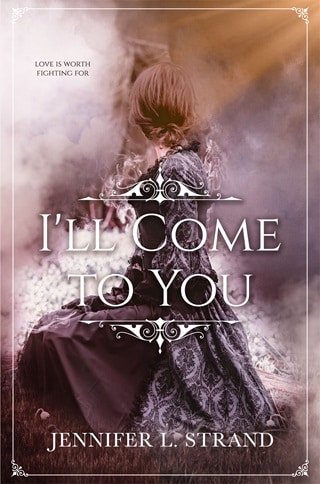14. Sickness
1863 DECEMBER–1864 JANUARY
14
"Miss Ella?" Kay's bubbly voice sounded as she shuffled around my bedroom, filling the porcelain washbowl with steaming water and poking the crackling logs in the fireplace. "Miss Ella, ye best be out of that bed. Mister John will be leaving in a moment. He's on his way out, he is. Ye need to get out of that bed if ye want to say goodbye."
I stretched and yawned, the memory of last night floating back to me. My body flushed, recalling the feel of his mouth and hands. But it was a tourniquet to my heart. John was leaving. I had walked away from him, and it made me physically ill.
"He wants ye up to say goodbye to him before he leaves to catch his train. Please, Miss Ella, do get up. And the misses want a word with ye as soon as Mister John has left, so not to embarrass ye further."
I quailed, knowing I had disappointed my hostess. Her words caused my head to throb.
"I don't feel well. I don't think I will be able to get out of bed today." Maybe it was a coward's move. "Tell John goodbye for me and extend my apologies to Mrs. Mathis. I have such a splitting headache this morning."
Kay finished draping fresh towels beside the washbowl. "But Mister John is leavin' an' won't be back for I don't know how long—however long this war has to last."
I grimaced at her mention of war's uncertainty.
"Tea, please," I rasped. A swallow sent a thousand tiny knives down my throat.
She hesitated, looking at me with concern, before skittering from the room.
Gray light from the early morning sky filtered through the window. Heavy sheets of white flakes drifted down. The cold floorboards penetrated through my wool stockings when my feet hit the floor. I shrugged a shawl over my shoulders and tiptoed to the window. My body screamed at me, my joints aching.
Spruce trees were dark silhouettes, weighed down with heavy snow and ice. Paths I had walked through the summer and the fall were now covered in a pristine, white blanket. My breath fogged the crystallized glass, and I wiped it clear with my shawl.
Thad rode around the house on his brown stallion, pulling two chestnut bay horses beside him. The beasts' brown, muscular legs sunk in the snow. A drift had yet to be cleared, covering the front steps. Thad dismounted his horse and plowed through the snow to the front door, disappearing beneath the portico.
Was I making a mistake letting John leave without a word? For all the strength I wished to portray, I was frightened. What if this was the end? John was returning to his regiment. To fight and to, what … get himself killed? I dreaded the thought, pulling my shawl tighter around me. I sniffed. My heart lurched with yearning, fearing this would be the last I'd see him.
I desperately wanted to run downstairs, throw myself into his arms, and never let go. My limbs itched with the need to follow him—to Virginia, to the ends of the earth. As if I could hold on to him and protect him! I shook my head, knowing it was irrational. I had responsibilities here … Katie to think about and a family to eventually go home to.
Thad returned with two leather-clad bags, which he strapped on to the saddles. John shuffled through the snow, hunched against the snowfall, to his horse. His collar was turned up to ward against the chill, his hat pulled low. Seth followed behind him, his lanky body matching John's steps, bundled in a gray, woolen coat and a black, felt cap. A knitted scarf wound up to his ears. They both mounted their horses with ease as though they had been born to it, and I suppose they had. Thad mounted his horse and turned it away from the house, into the wind and snow.
Desperation clenched my heart. My throat constricted. My hand went to the windowpane, wanting so badly to reach out and touch him, but I couldn't do anything as their horses waded toward the snow-packed road. He was leaving for good. If he did survive the war, would I be gone by the time he came home? Would Ethan still be a threat?
The horses turned the bend.
I waited, dreaming he might come back into view, galloping through the snow to the house, pounding up the stairway, flinging open the door to my room, pulling me into his embrace, and pressing his body against mine as he had done last night. But all I saw were hoofprints vanishing in the accumulation.
I was a coward. For if I were a brave girl, as John claimed, I would have been downstairs saying goodbye with all the others. More than anything, I was scared to see him go. I was afraid for him and afraid for myself. An overwhelming sense of foreboding coated me like the falling snow. Waves of nausea broke against me. Something was coming, and we had just made ourselves exposed, vulnerable to pain and suffering. And there was nothing I could do to stop it.
 Fullepub
Fullepub 



